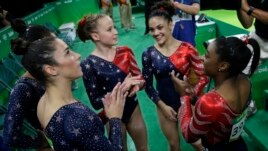22 August, 2016
This is What's Trending Today....
The 2016 Summer Olympics in Rio de Janeiro have come to an end, but people are still discussing media coverage of the event.
Several comments by Olympic broadcasters about women athletes led to a debate.

U.S. gymnasts, from left, Aly Raisman, Gabby Douglas, Madison Kocian, Lauren Hernandez and Simone Biles wait for the score during the artistic gymnastics women's qualification at the 2016 Summer Olympics in Rio de Janeiro, Brazil, Aug. 7, 2016.
During the team gymnastics competition, for example, an American broadcaster commented about the smiling and laughing U.S. women's team. They had just easily won a round of the competition. The announcer said that the athletes "might as well be standing in the middle of a mall."
Another American announcer credited Hungarian swimmer Katinka Hosszu's husband for making her a winning competitor. Hosszu's husband, American Shane Tusup, is also her coach.
And the Chicago Tribune newspaper identified bronze medal winner Corey Cogdell-Unrein in a headline as the "wife" of a Chicago football player. The headline failed to give Cogdell-Urein's name. She is an American competitor in the sport of trap shooting.
Equal time, unequal treatment
The Olympic Games are an opportunity for women's sports to get as much attention as men's sports on television in America.
A 2015 study from the University of Southern California found that the sports network ESPN spends only 2 percent of its broadcast time on women's sports. That rate has not changed in 26 years, the study found.
The Olympics, however, are more balanced. A team of researchers found that 58 percent of the television coverage in the first week of the 2016 Olympics included women athletes.
However, the way in which men and women athletes are discussed by the media is not always the same.
Researchers from Cambridge University studied more than 160 million words from news articles, social media, internet websites and other places. They researched the words used to describe men and women in Olympic sports.
The researchers found that men most often were described as "great" "strong" and "fastest."
Women, however, were described most often using words not related to their ability in sports. The researchers noted words like "older," "pregnant" and "married" were used often for women athletes.
People on social media have pointed out examples of what they consider sexism during the Rio Olympics. Sexism is the unfair treatment of people because of their sex.
Rebecca Brooks is a market researcher in Los Angeles. She told VOA that sexism in Olympic coverage is "nothing new."
"Many of the broadcasters covering the Rio Olympics are the same reporters who have covered the events in past decades," Brooks said .
Why, then, has sexism become a major topic during these Olympics? Some experts say social media may be the answer.
A.J. Marsden is a professor of psychology at Beacon College in Leesburg, Florida. She notes that young people, or millennials, are quick to notice such comments and then discuss them on social media.
Marsden also said that most of the broadcasters "accused of sexist statements are a little bit older."
Journalist Lindy West writes about gender equality. She recently wrote a report in The Guardian newspaper about sexism and the Olympics. She offered advice to reporters who cover women's sports.
"Don't spend more time discussing female athletes' makeup, hairdos....marital status and age...than you spend analyzing the incredible feats of strength and skills..."
She also said that reporters should simply write about women athletes "the way you write about male athletes....without mentioning their gender except maybe in the name of the sport."
And that's What's Trending Today.
Marissa Melton wrote this report for VOANews. Ashley Thompson adapted it for Learning English. Mario Ritter was the editor.
_______________________________________________________________
Words in This Story
coverage - n. the activity of reporting about an event or subject in newspapers, on television news programs, etc.
athlete - n. a person who is trained in or good at sports, games, or exercises that require physical skill and strength
mall - n. a large building or group of buildings containing stores of many different kinds and sizes
sexism - n. unfair treatment of people because of their sex, especially unfair treatment of women
journalist - n. a person who researchers, writes and edits news stories for newspapers, magazines, television, or radio
gender - n. the state of being male or female